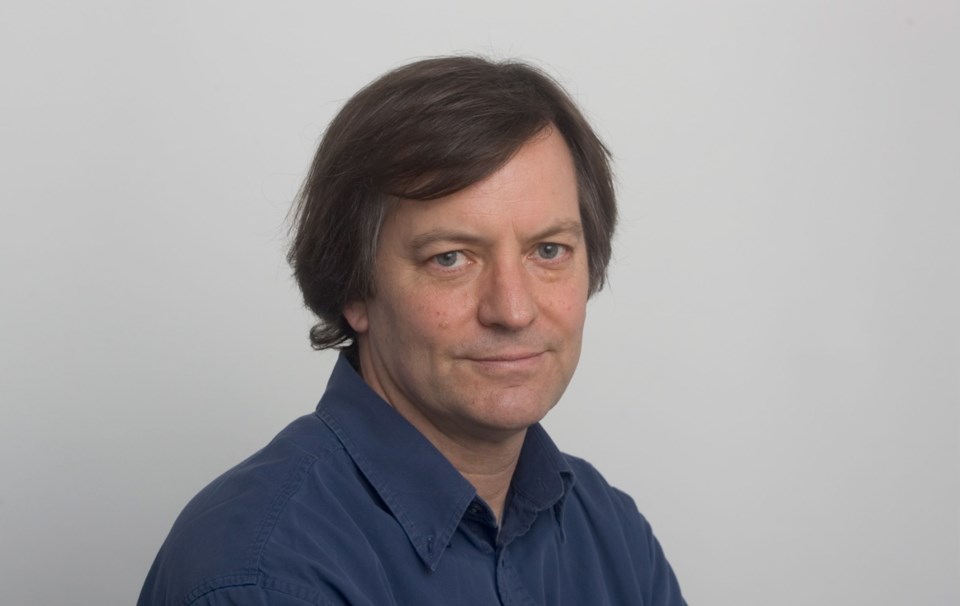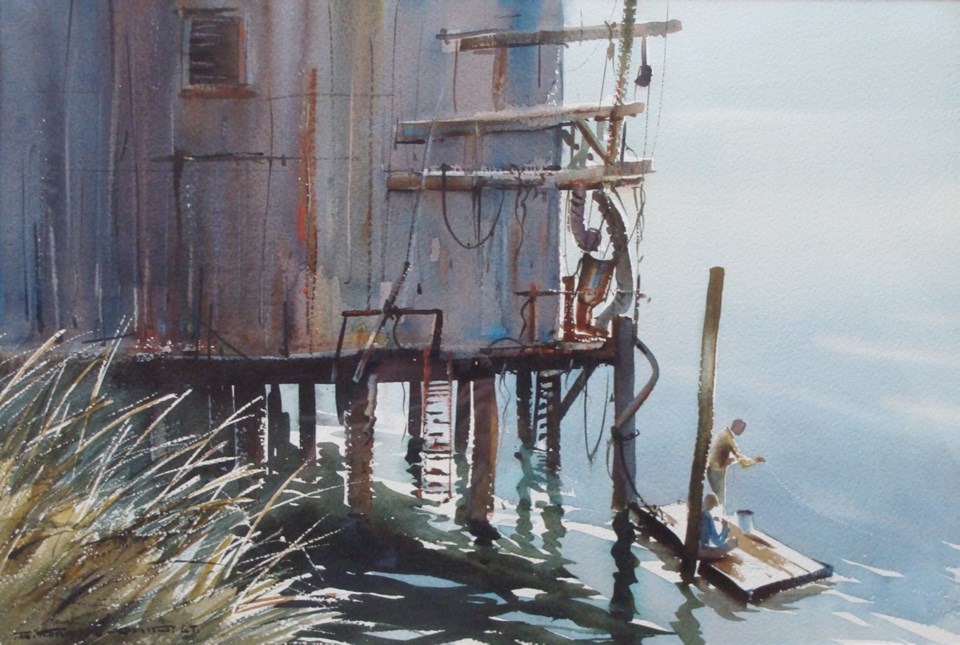 Recently, I interviewed Brian Travers-Smith, a legendary watercolour painter in the 1960s and 1970s, who abruptly stopped painting in 1983. This week, I noticed one of his fine watercolours in the window of The Gallery in Oak Bay Village (2223a Oak Bay Ave., 250-598-9890) and was inspired to share some things he told me.
Recently, I interviewed Brian Travers-Smith, a legendary watercolour painter in the 1960s and 1970s, who abruptly stopped painting in 1983. This week, I noticed one of his fine watercolours in the window of The Gallery in Oak Bay Village (2223a Oak Bay Ave., 250-598-9890) and was inspired to share some things he told me.
Travers-Smith’s grandfather was the illegitimate son of the first Earl of Birkenhead, a rich man who had an affair with a Miss Travers. So the earl sent him to a good school, gave him a nice, fat stipend and sent him abroad where he wouldn’t bring dishonour to the family.
He ended up in Tienjing in China. With his stipend, he bought a half-share in a department store. During the Boxer Rebellion, he owned a hotel and bakery that provided the bread the foreign legations survived on. Later, during the Russo-Japanese War, he became the intermediary who came up with a settlement between the two nations, as he could speak both languages.
The Russian government made him a large award, and he also received the Legion of Honour from France and a cash settlement in Britain. He reached colonel’s rank in the French army, and the Chinese honoured him — he had Chinese robes, like Chinese Gordon.
Grandfather retired to San Francisco a wealthy and famous man, but all his capital was tied up in real estate, and he was wiped out in the earthquake and fire of 1906, and left destitute. He ended up with nothing.
The artist’s father was born in Tienjing, and his son, Brian — our artist — was also born in China, and also grew up under siege.
“During World War II when I was seven,” he told me, “I had a very bad case of whooping cough. They called it ‘TB glands,’ and it came with chronic bronchitis and fever. I slept out on an outside porch until the hot-water bottle froze.” For 31Ú2 years, the Japanese kept the family in isolation, in a remote area of North China, because they thought he was infectious. “So I spent my time sketching birds,” he recalled. “I didn’t talk to anyone from the age of seven to 14 years.”
The family’s uncle Peter was there, too. He was an engineer, and painted watercolours.
“We went out one day,” Travers-Smith recalled, “and he said: ‘Just sit quietly and watch me work.’ While I was sitting, he was painting — the rock, the sunlight, the dark colour that resulted from the iron ore in the water. It was rippling, and he created a striking composition with the colours.” Uncle Peter also painted the Japanese in the watch towers of the internment camp.
Through the years of internment “my mother taught me everything,” Travers-Smith continued. After the war, the family came to sa���ʴ�ý, and he went to Brentwood College, and then to Victoria College for a couple of years, “though I never graduated,” he chuckled.
“Then I went to Toronto’s Ontario College of Art. We didn’t paint for the first year — just cross-hatching and shading things — drawing, really.” Ironically, the students were sent out to sketch — on the streets in Chinatown.
After marriage to his wife, Barbara, Travers-Smith raised a family in Victoria.
“I was working at sa���ʴ�ý Trust all day, as the wills officer, and my painting time was at night,” he recalled. “Things are quite still then, and I didn’t want to be interrupted.
“I made it a policy that I never carried a painting over to the second day. I always finished it in one session. The intended effect was spontaneity, and it was damn hard to do it.”
In years to come, inspired by artist and designer Allan Edwards, he resigned from sa���ʴ�ý Trust and built a studio onto their house on Transit Road, the site of his many memorable, sold-out shows.
Then Travers-Smith became president of the board of the Art Gallery of Greater Victoria — quite unexpectedly.
“I was second vice-president. The president suddenly resigned from the job and it had to be taken over by the first vice-president, who was Olive Heritage [principal of Central Secondary School]. She promptly fell down and broke both her forearms, quite badly.
“As second vice-president, I had to take over. But Colin Graham, the director, had been arranging for me to have a retrospective in the big room at the gallery. The sa���ʴ�ý Council had already provided funding for a nice colour catalogue.
“When I took over as president, I said to Colin: ‘I can’t have a show here at the gallery next year. How would it look?’ He said: ‘We’ll have to cancel it and have it another time, when you step down.’ But Colin took ill and he retired shortly thereafter. Whoever took over used the money provided for my catalogue for someone else.”
Looking back, Travers-Smith estimates that he painted a couple of thousand pictures.
“I painted what I wanted to paint, in my own way, and didn’t care what the heck anyone thought. If people liked it, dandy. If they didn’t, I was happy enough just to hang on to it.” At this point, only a few of those paintings remain with the artist.
But the end of his short and brilliant career was in sight.
“My father went blind in his 50s and I did not want to duplicate that situation,” Travers-Smith admitted. “I had to start cossetting my vision. I was feeling my age, and got quite depressed, so I decided to pack it in while I was ahead, and I retired from painting. I haven’t painted since 1983.”
The pleasure of his work lives on.



